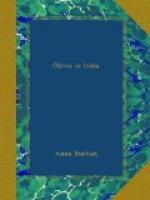“Miss Aitken’s teas!” I said promptly. Always that scent takes me straight back to sunny summer afternoons when
“The day was just a day to my mind,
All sunny before and sunny behind,
Over the heather,”
and myself in a stiffly starched frock, accompanied by three brothers with polished faces and spotless collars setting out to drink tea with our friends Miss Aitken and Miss Elspeth. There was always honey for tea, I remember,—honey made by the bees that buzzed through laborious days in their thatched houses in a corner of the sunny garden,—and little round scones, and crisp shortbread; and, as we ate and chattered, through the open windows the roses nodded in, giving greeting to their friends, the roses of past summers dried and entombed in great vases; and the scent of mignonette so mixed itself with the sound of gentle old voices and childish trebles, the fragrant tea in the fragile china cups, the prancing dragons in the cabinet, that now, over the years, it brings them all back to me as surely, as potently, as if it had been indeed a sprig of Oberon’s wild thyme or Ophelia’s rosemary for remembrance. As I have told you, we were naughty children, sometimes even wicked children, but our conduct at this house was, “humanly speaking, perfect.” The old ladies listened so sympathetically to our tales of how many trout we had that day guddled in the burn; of the colt we had managed to catch and mount—as a family—by the aid of the dyke, and of the few delirious moments spent on its slippery back before it threw us—as a family; of the ins and outs of why Boggley’s nose was swelling visibly and his right eye disappearing. They would look at each other, nodding wisely at intervals while they murmured, “Interestin’ bit bairnies.” Boggley, when young, was of a peculiarly fiery temper. At times one could hardly look at him without being confronted with squared fists and being invited to “come on”; but when Miss Elspeth, holding one of his pugnacious paws in her kind, soft hands, assured him he was the flower of the flock, and her boy, he was a Samson shorn for mildness.
Speaking pure Lowland Scots, which was a delight to listen to; full of a gracious hospitality embracing everyone in the district from the highest to the lowest; fiery politicians and ardent supporters of their beloved Free Kirk, to the upkeep of which I believe they would cheerfully have given their last copper, Miss Aitken and Miss Elspeth were of a type now unhappily almost extinct.
Miss Elspeth was the plain, clever one. “In my youth”, she loved to quote, “in my youth I wasna what you would ca’ bonnie, but I was pale, penetratin’, and interestin’.”




